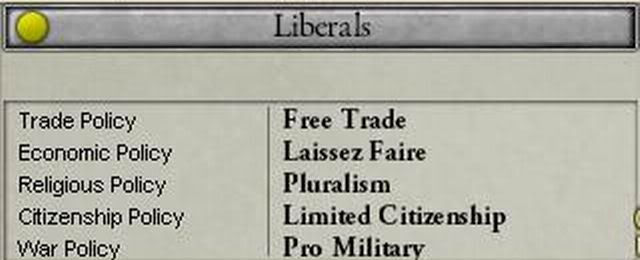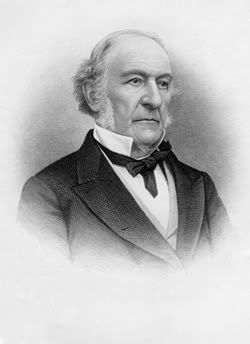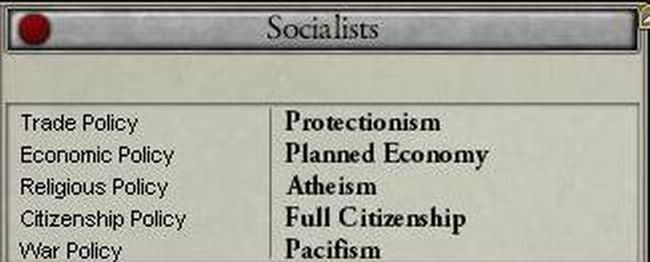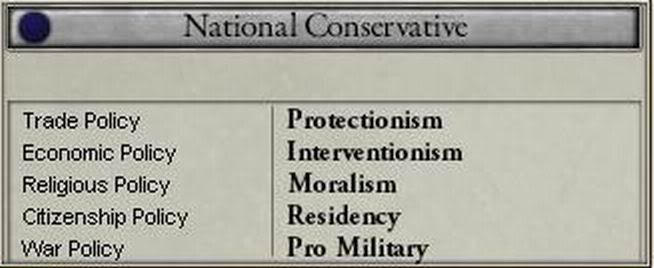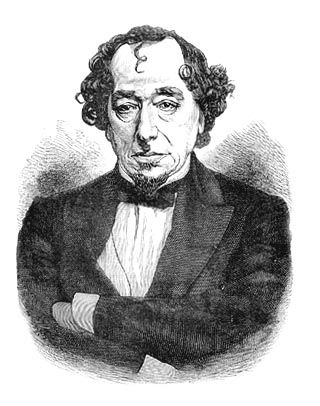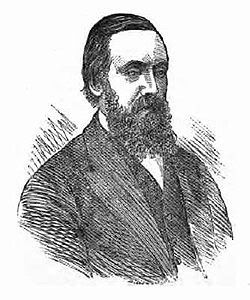The Election of 1875
With the return of Liberal government came the return of Britain to the affairs of the continental powers – a return that resulted in British participation in the Great War which in turn left hundreds of thousands of Britons dead, Sumatra and Sierre Leone in British hands and a united Germany on the continent stretching from Elass to central Poland. It was a definite shift from the isolationism of Labour.
The Liberal Party
after a stunning electoral success that create the first ever non-coalition government in the Republic's history the Liberals had put in a strong effort. Although economic growth faltered slightly the Liberals pushed forward their mandate of a more aggressive foreign policy to its fullest extent and did indeed expand the British Empire over new lands – most importantly the isle of Sumatra. Now seeking a re-election the Gladstonian Liberals look in a strong position.
Party Leader: William E. Gladstone
Gladstone had come to run the Liberal party in an almost Presidential manner. Dominating the entire party and demanding loyalty from all sections he had centralised its leadership around a smaller group with the express aim of ensuring that the old divides amongst Liberals did not re-emerge. These policies had allowed him to act with much greater ease in running a minority government, as with the party united he only required a small degree of support from Parliament's other parties, but had admittedly reduced debate.
Policies
Economic:
A system of tax cuts for the enterprising should be reintroduced; there should be no tariffs and extremely limited intervention by the government in economic affairs.
A free market makes a free society.
The market is much better suited to running itself than the state is to forcing its will upon in.
Reform:
It remains the central duty of this Liberal Party to protect the essential Republican freedoms won by the Whig and later Liberal Party in the first decades of the Republic. We stood against reaction and dictatorial leftism then and we do so today.
The Liberal Party also refused to interfere in the free movement of subjects of the Empire.
Foreign Policy:
Our victory in the Great War has forever ended French attempts to dominate all Europe. Instead there is now a clear balance of power between the French and the Germans. At this time that sacred continental balance is restored. However, let us not bind ourselves entirely to our new German friends – yes keep the friendship alive, but we must concern ourselves the balance of power in Europe above whatever fraternal ties we may have to Berlin. If the Germans go too strong or too cocksure we should not hesitate to have talks with Paris and Vienna.
In the Americas the Civil War is painful for Britain. Most importantly of all as the single most important supplier of cotton for the vibrant British textile industry (the cotton fields of the South) now lie under Union blockade. But there is little we can do. Let us not involve ourselves in the affairs of North America. So long as the Atlantic Provinces are not threatened this is not our concern.
The Socialist Party
After six years in opposition the Socialist Party had continued to develop itself as its grass roots ties to the labour movement expanded and solidified and it attached itself to progressive movements such as the movement for female suffrage. It was also the only party to oppose the bloody Great War, a position that won both great prestige and vilification, and the only party not to be invited into Gladstone's National Government. With a clear lack of legitimisation from the political mainstream the Party is now seeking to surge forward and secure its position at the ballot box.
Party Leader: George Odger
A lifelong trade unionist and labour activist the former cobbler has led the Socialist Party since its creation 7 years before. Immensely respected and extremely intelligent, if not quite so charismatic as the likes of Gladstone and Disraeli, Odger carries tremendous weight amongst the Left and leads a united opposition to the capitalist mainstream of British politics.
The Manifesto of the Socialist Party
''The Socialist Party shall fight tirelessly in the interests of the working class. We shall oppose any government that opposes those interests and we shall support any government's measures that strengthen those interests. We have no further interests beyond those of our class.
We Demand:
That the current minimal safety standards in factories be increased to acceptable levels.
(Two levels of reform)
That pensions for those who ave worked throughout their lives be increased from the current trinkets thrown to elderly workers to an acceptable level.
(Two levels of reform)
That our health service be improved further so that all citizens of the Republic shall have some sort of access to healthcare.
(One level of reform)
That the minimum wage be raised.
(One level of reform)
The institution of a heavily progressive tax system that shall turn the weak stream of wealth that flowed down to the workers under Labour into an unstoppable torrent.
The creation of low level working class democracy in the manner that the heroes of the Manhattan Commune created:
Workers' Councils are to be established throughout the Republic – these Councils shall be run by the local communities and shall allow the workers of a particular region to manner most of their affairs themselves.
Larger Regional Councils are to be created for entire cities or regions. In these Councils the delegates shall be elected representatives and shall be fully recallable.
Our political system must be restructured. Parliament shall be replaced by a Grand Council of the Republic. This Council shall be made up of delegates elected by the Workers' Councils themselves, all delegates shall be fully recallable. Elections for the Grand Council are to take place every 5 years.
That all land currently under the control of these wealthy land barons are to be seized by the farmers who work upon them and given over to these farmers so that they may own the land upon which they work.
That all inheritance rights are to be abolished – within a generation the old families of plutocrats and aristocrats shall finally have their booty, accumulated through the mass exploitation and murder of working men and women, wrenched from them.
That any property owned by emigrants or rebels is to seized by the state.
That any industries seized through this method, or through the abolition of inheritance, or through simple abandonment are to be turned over to the those who work in them to own and manage.
That all banking services are to be centralised under the banner of a national Bank – controlled by the state.
That the means of communication and transportation are to be turned over to the control of the state.
That the state shall be used to expand our industrial sector further and to provide financial support to struggling industries.
That the colonial holdings of the Republic be given their freedom – we must look to establish the same sort of working class democracy and control in these regions before granting them autonomy. However they shall retain our protection.
That a new Workers' Republic be declared!''
New Demands to be added to the Manifesto:
That all Women over the voting age be granted equal rights to voting as men.
That solidarity be shown between Britain and the workingmen of all other nations in their parallel struggles.
That Britain brings an end to its series of bloodthirsty wars for Imperial power that bring many thousands of young, working men to their deaths for the sake of a few thousand acres of jungle. No more!
Foreign Policy Initiative:
The Civil War in America is not a simple conflict between two Imperial blocs as the Great War was. Although the Union by no means stands exclusively on the side of the proletariat it is by all accounts the only progressive force within this battle. In the North lies a government that vows to end the repression of the labour movement – in the South one that has risen to prevent the repression's end. In the North lies a government that shall stand against the the abominable institution of slavery – in the South one that is willing to fight to protect it. Labour in white skin can never be free, so long as labour in black skin is in chains. We must support the Union in its war against the Confederacy!
Let us give our friendship to Lincoln and send subsidies to the Union so that their victory over the slave owning armies of the Confederacy and of Mexico can be secured.
Workingmen of all countries unite!
The National Conservative Party (Tories)
The recently found NCP is the union of the Conservative Party and the British National Union after the electoral failure of both in 1869 left the Right in British politics severely isolated. The unification of the two parties allowed the new Tory grouping the chance to become Parliament's joint second largest party and gave the right-wingers significant influence over the Gladstone government – the NCP playing a major role in sending Britain to war and then in pushing her to the more aggressive position of invading France.
Party Leader: Benjamin Disraeli
The former Prime Minister had been restored to the Conservative Party leadership in the aftermath of Lord Derby's débâcle that had left the Tories as Britain's 5th largest party behind both the IPP and the Socialists. He quickly moved to try to unify the right-wing forces that had originally split under his tenure as party leader and successfully formed the National Conservative Party – a party founded around traditional conservative positions mixed with a belligerent foreign policy and militant anti-communism.
Policies
Economic:
We propose a flat tax regime.
Social spending should remain as high as possible.
Tariffs shall be used to raise funds and to protect native industries.
If need be, to avoid unemployment, subsidies can be provided to ensure that industries remain operative if they start to lose money in the short term.
Subsidies for the expansion of industries may also be provided in order to fight unemployment.
Reform:
The rampant immigration of foreigners from every godforsaken corner of the Empire must be stopped! London is not Surat or Amphaniny, so why is it crawling with Indians and Malagasy? It is unquestionable that the recent rise in unemployment is being caused by this great wave of new arrivals who are forever changing the shape of our nation and are indeed destroying it as a nation. As our food supplies and economy are strained to their fullest extent Britannia's image is being torn up and thrown away! Say no to unemployment, say no to the loss of our national identity, say no to immigration, say yes to the National Conservative Party! Protecting the British people from all threats.
Moreover, a much great threat to this nation, to its people and to are freedom remains the haunting spectre of communist terrorism and agitation that breeds hatred between the classes and destroys harmony. Who was it who stood by the ships as our brave fighting men went out to serve their country and protested against the war? It was the Socialist. Who supported the refusal of conscription and cared nothing of whether the French (who if given the chance would have launched a much larger invasion of Britain than they did when they raped Cornwall) were defeated? The Socialists! Enough of this anti-British agitation.
These Socialists, these communists, these utopian terrorists, have no place in the British political system. They do after all want to destroy it and create their 'Workers' Republic (no doubt run by the corrupt trade unions and their party lackeys. We therefore propose the banning of the Socialist Party from Parliamentary action. No party that supports the dissolution of the Republic and Parliament is to be allowed to compete in Parliamentary elections.
Foreign Policy:
It is true that too much was sacrificed for what was gained in the Great War. But that is no argument against the war itself, that is an argument for better diplomacy – something a stronger NCP government would be able to provide. In Europe Liberal triumphalism over the defeat of France is very premature. French industrial output stands at 3 times Germany's, the French Army is twice as large and the Germans have no navy to speak of, not to mention the fact that France maintains a web of alliances across the continent. France is still the primary threat to the balance of power and Germany, our cultural brethren, remains the only roadblock. We therefore propose closer ties and even an alliance with the German Empire in order to finally break the French in Europe and save the continent from their rule.
The events in North America must make every voter ask themselves a question. What has the Union ever done for us? Whilst we were engaged in Civil War they supported and participated in the dissection of our Empire – they still occupy North Maine, Bermuda, the Bahamas, the Turk and Caicos Islands. Whilst we offered them the hand of friendship they remained aloof and unwilling to accept it. Their mismanagement of their affairs led to the Manhattan rebellion that has since caused so much trouble over here. Whilst we fought for our lives in Europe they did nothing. The Union has never assisted this Republic and we shall not assist the Union. This is an ideal opportunity to break the US stranglehold over our fellow British in Canada and may well allow us to expand our influences in the Americas. Let the Americans bleed themselves out and let Britain restore her pride. We shall support the weaker side – the Confederacy – with subsidies in order to create a stalemate and leave that American super power divided and unable to hold the Canadians back from our arms.
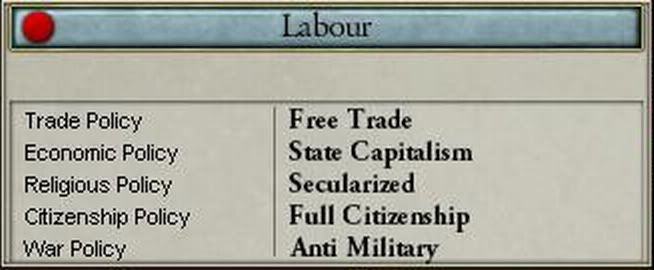
The Labour Party
The past years have been hard on the Labour Party. Division, harsh losses in the election of 1869 and then years of rather uninspiring leadership under Burt whilst the Party continues to struggle through an identity crisis. The party seems unable to decide whether it should be the 'sensible' socialist alternative to Odger's radicals or whether it should look to move closer to the centre and to the likes of the Liberals. There was also a growing divide between the more right-wing leadership of Burt and the Labour grass roots supporters amongst the factories and the trade unions.
Party Leader: Thomas Burt
One of 3 former Prime Ministers standing for the 1875 election Burt is perhaps the least secure in his position. Anything other than a strong Labour performance and perhaps even a place in a government would likely mean the end of his leadership of the party.
Policies
Economic:
Neither the Tories nor the Liberals have been able to match the economic successes of the Labour Party. Neither have even attempted to match the party in our battle to secure greater equality within Britain. Under either parties all that awaits is economic hardship, unemployment and inequality. Labour had promise growth, jobs and a more even distribution of wealth.
''We support a progressive taxation system in which the wealthiest shall pay taxes 20% higher than those on middle incomes who shall in turn pay 10% more than the poorest.
We should raise social spending to the highest level it can reach.
If need be the state should intervene in order to ensure that vital factories remain open so that workingmen do not lose their jobs.
We should use the state to support continued industrial growth in both Britain and Ireland.’’
A vote for Labour is a vote for a safe pair of hands and for guaranteed economic success. Under the Tories or Liberals there has always been high levels of unemployment in some part of the country – not so under Labour! Let each man have a job to go to in the day and food to fill his belly at night.''
Reforms:
The Labour Party supports 2 further reforms:
Let there be better safety standards in the heavy industries – there are simply far too many injuries and even deaths in these dangerous but invaluable factories.
Let there be a small increase in the pension for all men and women who retire after working for 50 years.
Foreign Policy:
Whilst the Great War did indeed stop the French from conquering Europe it was also horrifically costly. We can not afford to get involved in such a battle again. Labour therefore supports a return to the policy of isolation from the wars of Europe in order to save British lives from foreign guns.
In North America the United States is engaged in a Civil War against the Southern slave owners who support the oppression of labour movements. There is no question over which side Britain should stand aside. We promote friendly ties with Lincoln's government and would look to improve relations further after the war. However, we cannot afford to get overly involved in this conflict across the ocean.
The election is now open!
Every reader has one vote and may only vote once per election.
You may vote for:
Liberals
Socialists
National Conservatives (you may all write NCP or Tories or similar variation)
Labour
Please either bold your vote or place it in a separate post to make it easier for me to count them.
Polls shall close at 2 PM on Sunday.
Good Luck!
